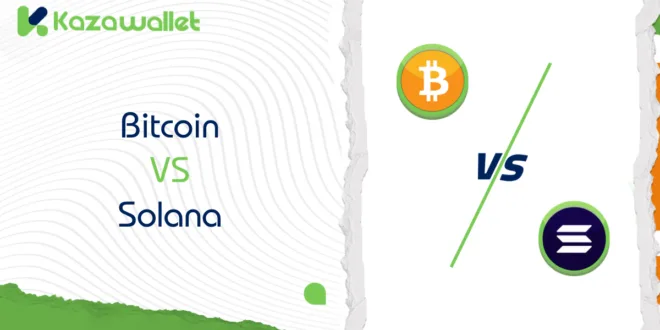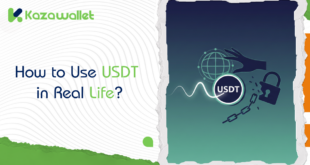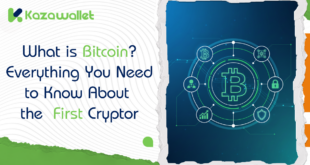Bitcoin, the cryptocurrency giant, and Solana, the fast-rising newcomer, appear vastly different at first glance. However, a deeper understanding reveals fundamental differences that go beyond mere market capitalization.
While Bitcoin aims to be the new “digital gold,” Solana aspires to be the infrastructure for the new internet, prompting a key question: What’s the difference between Bitcoin and Solana? Which is better for investment, and which best suits your needs?
This article explores Bitcoin vs Solana and the key differences between Bitcoin and Solana, highlighting their strengths and weaknesses beyond common generalizations.
What is Bitcoin?
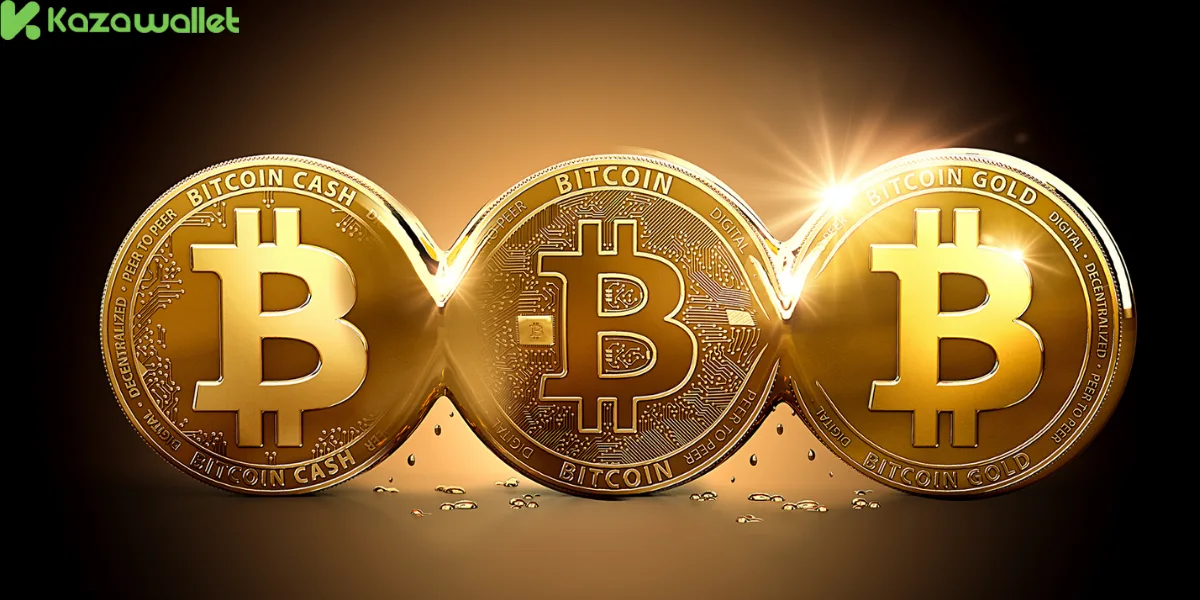
Bitcoin is a decentralized, encrypted digital currency bought, sold, and traded directly between individuals without the need for a financial intermediary like banks. Instead of relying on the trust of governments or financial institutions, Bitcoin relies on a secure, mathematics-based system embodied in blockchain technology.
This system, through a mining process that verifies and secures transactions, ensures the transparency of every Bitcoin transaction. All transactions are stored in a public ledger known as the blockchain—a global, tamper-proof accounting system, similar to registered mail but on a global scale.
Bitcoin can be used as a means of payment, an investment tool, or even a store of value. It’s considered the first successful cryptocurrency and the foundation for many other cryptocurrencies that followed. Although a high-risk investment due to its significant price volatility, it offers substantial opportunities for investors seeking high returns.
What is Solana?
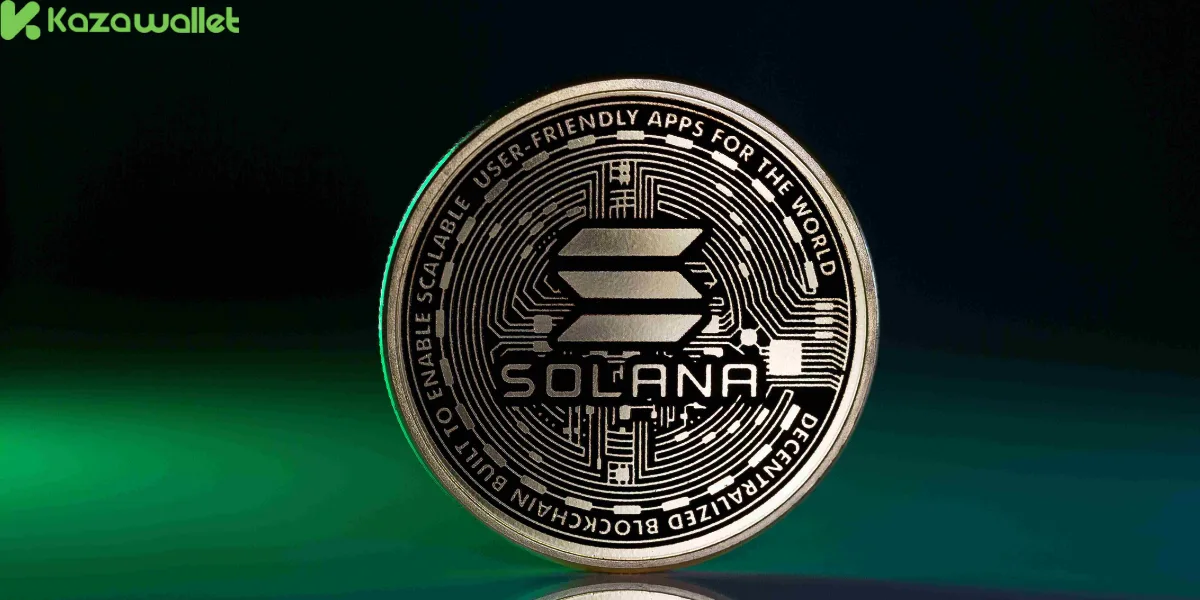
Solana is an open-source blockchain platform designed to facilitate the development and deployment of decentralized applications (dApps). It boasts the ability to process up to 65,000 transactions per second (TPS) thanks to its advanced infrastructure based on a distributed computing system. This speed makes it significantly faster than many other currently available blockchain platforms.
This superior performance stems from an innovative consensus mechanism combining Proof-of-History and Proof-of-Stake technologies, along with parallel transaction processing. These mechanisms improve transaction efficiency and speed while ensuring a high level of security.
Unlike stablecoins, Solana has its own cryptocurrency, SOL, whose value fluctuates in the market like Bitcoin or Ethereum. SOL is used as a payment method within the Solana platform and is the cornerstone of the network’s operation.
The Solana project aims to provide a fast and efficient working environment for developers to build and run diverse decentralized applications, including but not limited to gaming applications, decentralized finance (DeFi) applications, and other applications that benefit from high transaction processing speeds.
USDT vs Solana: A Comparison of Risks and Stability
Bitcoin vs Solana
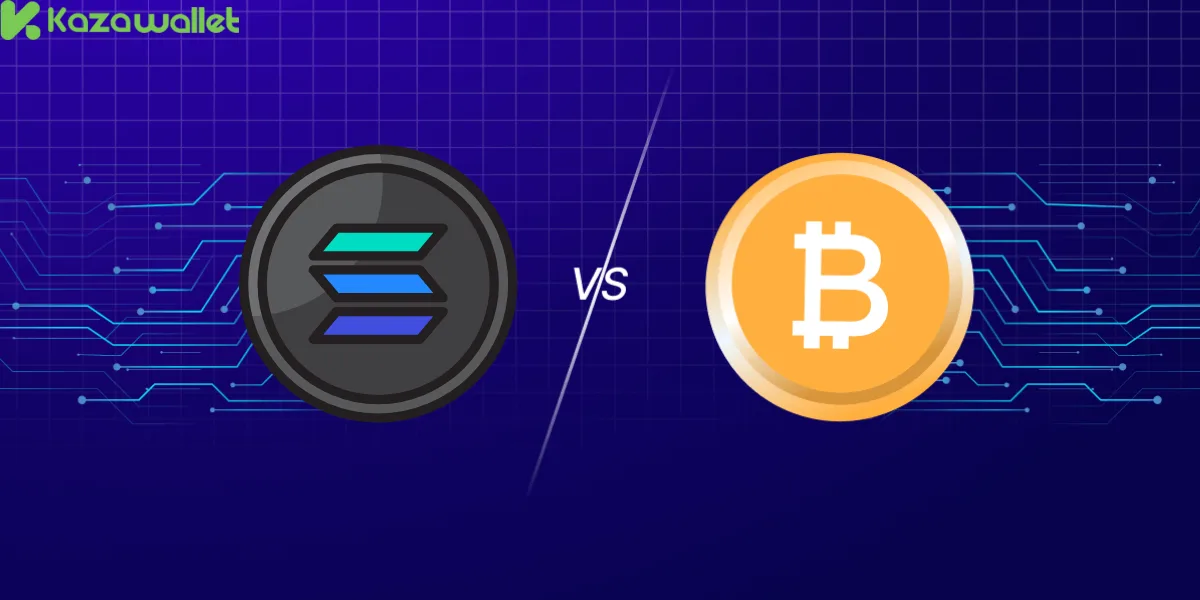
Primary Purpose:
- Bitcoin: When we talk about Bitcoin vs Solana, we should mention that it was Created as an alternative to the traditional financial system. Its core philosophy centers on providing a decentralized payment system independent of banks or governments. Over time, Bitcoin has evolved into a “digital gold,” primarily used as a store of value.
- Solana: In contrast, Solana aims to be more than just a cryptocurrency. It’s designed to be a platform for developing decentralized applications (dApps) and modern financial services like DeFi and NFTs. In other words, Solana is not just a currency but a complete ecosystem.
Stability:
- Bitcoin: Bitcoin is relatively more stable compared to other cryptocurrencies due to its longevity and established market presence. However, it remains susceptible to sharp price fluctuations, especially during periods of global economic volatility.
- Solana: When we talk about Bitcoin vs Solana, we should mention that, being a newer currency, Solana is more volatile. Its price can be significantly affected by technological developments or news related to the network. This makes it riskier for short-term investors but may offer greater growth opportunities in the long term.
Technology:
- Bitcoin: When we talk about Bitcoin vs Solana, we should mention that Bitcoin relies on traditional blockchain technology with a Proof-of-Work (PoW) mechanism. This mechanism requires significant computing power to secure the network, making it highly secure but relatively slow in processing transactions (approximately 7 transactions per second).
- Solana: Solana uses Proof-of-History (PoH), an innovative mechanism allowing thousands of transactions per second (up to 65,000 TPS). Additionally, Solana relies on Proof-of-Stake (PoS), making it more energy-efficient than Bitcoin mining.
Supply:
- Bitcoin: One of Bitcoin’s most important features is its scarcity. The maximum number of Bitcoin is capped at 21 million. This makes it similar to precious metals like gold, where limited supply helps maintain its value.
- Solana: It doesn’t have a strict maximum supply limit, but it has a defined inflation rate aimed at maintaining network stability. This means the number of Solana coins may increase over time, which could affect its long-term value.
Usage:
- Bitcoin: When we talk about Bitcoin vs Solana, we should mention that Bitcoin is primarily used as a means of payment or a store of value. Due to its slow transactions and sometimes high fees, it’s not the best option for small, everyday transactions.
- Solana: Thanks to its high speed and low transaction costs, Solana is ideal for DeFi and NFT applications, as well as being a usable currency for daily transactions.
Decentralization:
- Bitcoin: Bitcoin is considered more decentralized due to its nodes spread across the globe. This makes it less susceptible to control by a single entity.
- Solana: While decentralized, the concentration of nodes in the hands of fewer participants raises some concerns. This makes it more vulnerable to the risk of centralized control compared to Bitcoin.
Acceptance and Adoption:
- Bitcoin: Enjoys widespread acceptance and is the most well-known and widely used cryptocurrency. It’s supported by many large companies and financial institutions, strengthening its position as a major cryptocurrency.
- Solana: Still in its growth phase, but rapidly gaining popularity due to its advanced technology and ability to support modern applications. However, it needs more time to achieve the same level of acceptance as Bitcoin.
Costs:
- Bitcoin: When we talk about Bitcoin vs Solana, we should mention that transaction costs on the Bitcoin network can be high, especially during peak times when the network is congested.
- Solana: Solana boasts extremely low transaction costs, making it an attractive option for developers and users who need to perform frequent transactions.
Bitcoin vs Binance: Which is Better for Investment?
The Risks Associated with Bitcoin and Solana
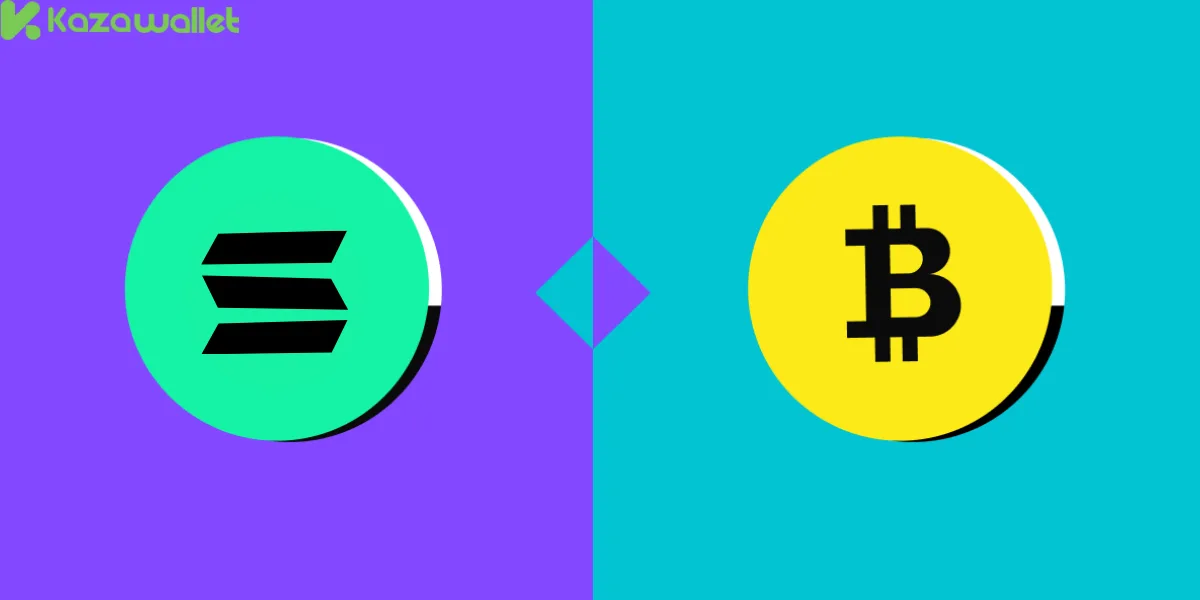
Risks Associated with Bitcoin:
Price Volatility: Bitcoin is characterized by significant price fluctuations. Its value can change dramatically in short periods, making it a high-risk investment.
Fraud: The Bitcoin market is rife with fraud risks. Investors can fall victim to scams through unreliable platforms. Investors might be tricked into buying Bitcoin from these platforms, leading to substantial financial losses.
Security: Bitcoin and other cryptocurrencies are vulnerable to hacking and theft. If your cryptocurrencies are stolen, recovering them is extremely difficult. Even with a secure digital wallet, losing your password or private key means permanent loss of funds. Therefore, choosing a highly secure digital wallet, such as Kazawallet, is crucial.
Regulation: The Bitcoin market currently operates without major regulatory frameworks, making it susceptible to changes in laws and regulations. For example, a government ban on Bitcoin trading could significantly decrease its value. These regulatory changes can negatively impact Bitcoin’s usage and acceptance as a payment method or investment.
Technical Flaws: Bitcoin relies on blockchain technology, which may contain technical flaws or security vulnerabilities. These vulnerabilities can be exploited by hackers, leading to theft or network disruption. Additionally, technical problems within the system can affect the network’s efficiency and security.
Influence of Global and Political Events: Cryptocurrencies, especially Bitcoin, are highly sensitive to global political and economic events. International developments, such as economic crises or political decisions, can cause significant fluctuations in Bitcoin’s value. This volatility makes it less stable compared to traditional assets.
Global Trends: Despite the challenges, some countries are beginning to adopt Bitcoin as part of their financial strategies. For example, Germany has started accumulating Bitcoin reserves. Other countries like the United States, Russia, and Brazil are exploring similar approaches, reflecting the growing recognition of cryptocurrencies’ value in the global financial system.
Risks Associated with Solana:
Partial Centralization: Although a decentralized platform, Solana relies on a relatively small number of validators compared to some other more distributed blockchain networks. This makes it more susceptible to sabotage or centralized control by a small group of individuals or entities.
Any malfunction or failure of these validators, whether due to an attack or a technical problem, can significantly impact the entire network’s performance, potentially leading to service outages or significant transaction slowdowns.
Scalability Issues: Despite its high transaction speeds under ideal conditions, Solana has experienced recurring scalability problems in the past. During peak periods, when demand on the network increases significantly, this has led to noticeable transaction slowdowns or even complete stoppages.
Frequent Outages: Solana has experienced several outages in the past, resulting in service interruptions for specific periods. These frequent outages raise serious questions about the network’s reliability and its ability to provide stable and reliable service in the long term.
Dependence on Rust Language: While the Rust programming language is relatively secure and designed to minimize errors, any undiscovered security vulnerability in this language, or in its implementation within the Solana network, could significantly impact the overall network security and expose it to serious attacks.
Transaction Failures: Solana sometimes encounters problems scheduling and including transactions in blocks, leading to unexpected transaction failures or delays. This issue negatively impacts the user experience and increases uncertainty about the network’s reliability and its ability to process transactions efficiently.
Dependence on Built Projects: Solana’s value partly depends on the success of the decentralized applications (dApps) built on it. The failure of these projects or a decline in their popularity could negatively impact the value of SOL and reduce demand.
Government Regulation: Cryptocurrencies, including Solana, are subject to increasing government regulation that can change rapidly in different countries. These regulations can significantly impact Solana’s use and trading, limiting its growth or subjecting it to laws that hinder its operation.
Theft Risks: Strict security measures must be taken to protect SOL wallets from theft. This includes using secure wallets such as Kazawallet, which allow for two-factor authentication and other essential security measures to protect digital assets.
In the end:
Determining whether Bitcoin or Solana is “better” is impossible. Both represent investments with different risks and rewards. If you’re looking for a relatively stable store of value with a proven track record, Bitcoin might be the better choice.
If you’re willing to take on the risks of a rapidly evolving world of decentralized applications with higher price volatility, Solana might be more suitable.
Investors should conduct thorough research and understand the difference between Bitcoin and Solana, the risks of each cryptocurrency before making any investment decisions, considering their investment goals and risk tolerance. The ever-changing world of cryptocurrencies demands caution and complete awareness.
 Blog Kazawallet
Blog Kazawallet
